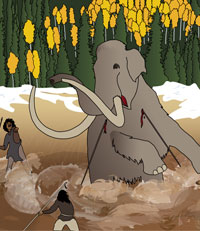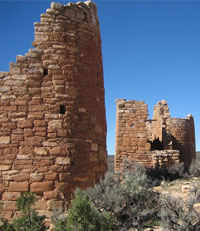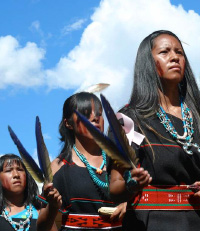AMERICAN INDIAN KNOWLEDGE
Indigenous voices provide cultural lenses on the interpretation of archaeological findings.
“We have a responsibility to the land, all things on the land, to one another, and to our ancestors. These places are still occupied by ancestor spirits.”
– Dr. Joseph Suina
![]() We begin every meeting at Crow Canyon with a moment of gratitude. I’m particularly grateful when our Trustee Dr. Joseph Suina sets the tone with a prayer in his Native language of Keres. He reminds us to bring good hearts to our work, and to be mindful of the ancestors who lived on the landscape where we study and teach.” —
We begin every meeting at Crow Canyon with a moment of gratitude. I’m particularly grateful when our Trustee Dr. Joseph Suina sets the tone with a prayer in his Native language of Keres. He reminds us to bring good hearts to our work, and to be mindful of the ancestors who lived on the landscape where we study and teach.” —
Liz Perry, President & CEO
The Crow Canyon Archaeological Center acknowledges the Pueblo, Ute, Diné (Navajo), Jicarilla Apache, and Paiute people on whose traditional homelands this institution sits. We are grateful to all Indigenous people who continue to preserve and protect cultural traditions, maintain ancestral relationships, and steward these lands.
We encourage you to explore the deep cultural history of this landscape.
What is Indigenous Archaeology — and What Does it Mean for Crow Canyon?

Indigenous archaeology is a form of archaeology where Indigenous knowledge, values, and goals are the underpinnings of research. Processes and products define indigenous archaeology—not necessarily who is conducting the work. In fact, it’s commonly mistaken as a sub-discipline of archaeology practiced only by Indigenous peoples around the globe.
Its practitioners—Indigenous and non-Indigenous alike—aim to transform general archaeological practices and outcomes to be more inclusive of and relevant to Indigenous peoples.
Crow Canyon incorporates Native perspectives into mission-related programs and projects
In addition to providing a cultural lens on the interpretation of archaeological findings, Indigenous voices add depth to multivocal education curricula, and help direct the design of projects that are culturally relevant and directly benefit Native communities in the Southwest.
Perspectives on Pueblo History and Culture
Crow Canyon’s research has historically focused on Pueblo histories; however, we now have many educational and collaborative projects that include multivocal approaches to historical narratives. Pueblo historical perspectives are shaped by their deep cultural heritage, kept alive through oral traditions. Archaeologists’ understanding of Pueblo history derives primarily from the application of the scientific method.
In this series of videos, Pueblo people and archaeologists discuss aspects of Pueblo history and culture from their different—but often complementary—perspectives.
Filmed at Crow Canyon, in partnership with History Colorado and the Science Museum of Minnesota; funding provided by the National Science Foundation.

Watch these videos
Locations of areas discussed in the videos.


Native American Scholar In Residence Program
Our Native American Scholar in Residence Program contributes to the development of a more holistic understanding of modern and past Native cultures, trust relations, Native perspectives and interpretations in the disciplines of archaeology, anthropology, education, and American Indian studies. Resident Scholars provide program participants with cultural knowledge, perspectives, and insights to existing curricula for student and adult participants from across the nation.
American Indian Initiatives Internship
Our American Indian Initiatives Internship is designed to support the American Indian Initiatives Department and enhance Crow Canyon’s commitment to Native American involvement in archaeology and education, as well as its commitment to Native American communities. Our interns are also invited to develop their own projects.

Timelines
The following timelines mark significant, but selected, developments and events in Pueblo history as documented in the archaeological and historical records. The timelines do not pretend to represent the perspectives of Pueblo people, who have their own approaches to remembering, documenting, and interpreting events important to them. For Pueblo perspectives on their history and culture, see Voices.
The timelines are not grouped by archaeological periods, because the date ranges for periods vary from region to region in the Pueblo Southwest. If you would like to approximately correlate the events presented in the timelines with archaeological time periods, see the Pecos Classification for one example.



